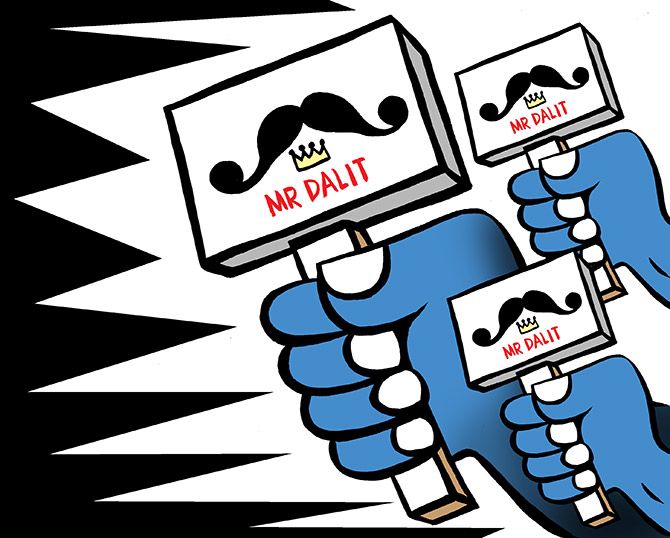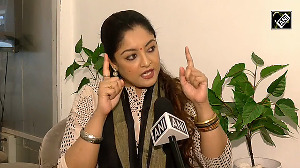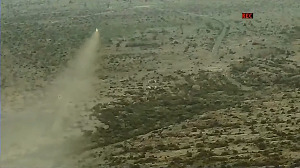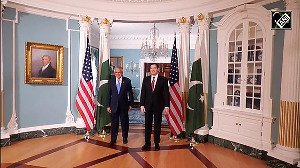The moustache protest is the latest blot on the face of a nation that has failed to ensure even the safety of the Dalit community, says Veenu Sandhu.
Illustration: Uttam Ghosh/Rediff.com

A turf war has broken out in Gujarat, and at the centre of it is the innocuous moustache.
Often seen as a sign of masculinity, it has overnight become a weapon of protest and identity assertion.
After some Dalit men were allegedly attacked by Rajputs for sporting a moustache, a privilege they believed only upper castes have the right to, over 300 Dalits from villages around Sanand in Gujarat have turned to this very symbol of dominance to lodge their protest and challenge their oppressors.
They have put up a logo of a twirled moustache with a crown beneath and the words 'Mr Dalit' written below as their WhatsApp profile picture.
One can understand why the Rajputs felt threatened at 'their' moustache being usurped.
History shows that in India, as in some other cultures, a moustache is so much more than a facial hairstyle a man chooses to affect.
It is a sign of virility, of dominance, a symbol of dignity -- and, also, of caste status.
Look at the soldiers of the Rajputana Rifles, the most senior rifle regiment of the Indian Army, and you will find a majority of them with a moustache that sometimes covers half their cheek.
To truly understand the power that the moustache in India wields, let's step back in time to the days of the Raj, when the mostly clean shaven British officers had trouble exercising authority over Indian soldiers who saw the absence of hair on their upper lips as a lack of manliness.
So severe was the problem that the British officers were compelled to start growing moustaches. Through these newly moustachioed officers, the macho look would eventually travel to Britain where the civilian population would adopt it.
There are cultures that openly berate a man who does not have a generous moustache, which, incidentally, has also been the subject of several studies.
One such piece of research, 'Moustache Fashion Covaries with A Good Marriage Market for Women', by Irish-born scholar Nigel Barber, suggests that 'facial hair is worn to enhance a man's marriage prospects by increasing physical attractiveness and perception of social status'.
When men have difficulty finding spouses, they are more likely to emphasise sexually selected traits, such as moustaches, says the 2001 research work.
The same marriage market correlation, it appears, also applies to the job market.
According to 'The Influence of Facial Hair on Impression Formation', a 1990 study, people in management positions, including women, are more likely to hire men with moustaches and beards.
The employers rate moustachioed men higher because they perceive them to be more mature, dominant, confident, industrious, intelligent and competent.
With the moustache symbolising all of these traits, and more, it is not a surprise that the upper castes are so possessive about it.
Facing atrocities for centuries, Dalit men have done well to adopt this powerful symbol of caste bias to hit back.
But this is not the first time the community has felt the need to challenge such biases through the very symbols of their oppression.
Last year, Dalit entrepreneur Chandrabhan Prasad turned to food, which is still often rejected by the upper castes if cooked or served by a Dalit, to make a point.
He launched 'Dalit Foods', ingredients for which are sourced from Dalit farmers and vendors. If
there can be a 'Brahmins sambar powder', then why not a Dalit pickle?
Another Dalit entrepreneur, Bengaluru-based millionaire Raja Nayak, opened a packaged water unit to make a similar statement.
He had heard stories of how his parents and grandparents were barred from drawing water from the same source used by upper castes because they were Dalits.
Bhimrao Ramji Ambedkar, icon of the Dalit community, the man who gave the country a Constitution that upholds the right to equality, was also not spared. So much so that he felt compelled to embrace Buddhism as the only way to escape caste oppression.
The existence of a separate Dalit Indian Chamber of Commerce and Industry, in spite of an active Federation of Indian Chambers of Commerce and Industry, also reflects the exclusion the community continues to face.
The ongoing moustache protest is only the latest blot on the face of a nation that has failed to ensure even the safety of the Dalit community.












